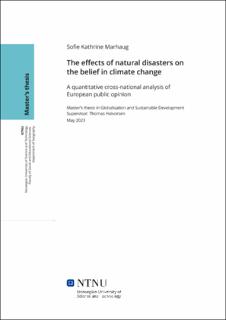Sammendrag
As global temperatures are rising and climate is changing, natural disasters are expected to increase in frequency and strength. Despite countless warnings and cries for action from experts, the UN and environmentalists, some individuals do not believe that the climate is changing, namely climate sceptics. This paper examines the effect experiencing a natural disaster has on Europeans’ belief in climate change, where the effect of heat waves, wildfires, and droughts are investigated. Additionally, the interaction between individuals’ values and experiencing a natural disaster is analysed, to evaluate how this can impact climate sceptic beliefs. The analysis uses data from the European Social Survey round 8 and the Emergency Event Database to conduct an ordered logistic regression analysis. A limitation to the data is the fact that within the sample only a small proportion of the respondents have experienced a wildfire or a drought period, which means that these results should be investigated further. Nevertheless, the results show that experiencing a natural disaster has an effect on the respondents’ belief in climate change. Individuals who have experienced a heat wave or a wildfire are more likely to believe that climate is changing. In contrast, are people who have experienced a drought period more likely to be climate sceptics. Anticipating, values having a large impact on Europeans’ belief in climate change, the analysis reaches a surprising conclusion, where the only value that has a significant interaction with all three natural disasters is the value of living in safe and secure surroundings. Nevertheless, the analyses show that there is a connection between an individual's values and the effect of a natural disaster on whether the person believes the climate is changing.
